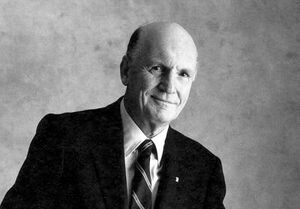Difference between revisions of "Richard Furlaud"
(image) |
(unstub) |
||
| (One intermediate revision by one other user not shown) | |||
| Line 1: | Line 1: | ||
{{person | {{person | ||
|prabook=https://prabook.com/web/richard_mortimer.furlaud/647028 | |prabook=https://prabook.com/web/richard_mortimer.furlaud/647028 | ||
| − | |image=Richard Furlaud. | + | |image=Richard Furlaud.jpg |
| + | |description=[[Big Pharma]] executive responsible for making his company the global leader of the problematic drug [[statins]]. | ||
|alma_mater=Harvard University, Princeton University | |alma_mater=Harvard University, Princeton University | ||
| − | |nationality= | + | |nationality=US |
|birth_date=15 April 1923 | |birth_date=15 April 1923 | ||
|birth_place=New York | |birth_place=New York | ||
|death_date=10 September 2018 | |death_date=10 September 2018 | ||
| − | |death_place=East Hampton, | + | |death_place=East Hampton, New York, USA |
|constitutes=businessman, lawyer | |constitutes=businessman, lawyer | ||
}} | }} | ||
| − | '''Richard | + | '''Richard Mortimer Furlaud''' was an American [[pharmaceutical executive]]. He was a member of the [[CFR]]. |
| + | |||
| + | ==Career== | ||
| + | Furlaud worked for the [[Olin Mathieson Chemical Corporation]] from 1955. | ||
| + | |||
| + | He was president, chief executive,and director for the Squibb Corporation.<ref>http://www.hbs.edu/leadership/20th-century-leaders/Pages/details.aspx?profile=richard_m_furlaud</ref> 1966-1974; and director at Squibb Corporation (merged with Bristol-Myers Company), [[New York City]], 1974-1989; president, board directors, Bristol-Myers Company (renamed Bristol-Myers Squibb Company), New York City, 1989-1991.<ref>https://prabook.com/web/richard_mortimer.furlaud/647028</ref> | ||
| + | |||
| + | Furlaud focused on Squibb's pharmaceuticals, investing in research and development that ultimately led to the introduction of several new drugs. Furlaud's streamlining and consistent support of the company's cardiovascular drugs paid off as the drugs' revenues jumped $240 million in one year. His changes at Squibb, though risky and at times controversial, allowed the firm to become a global leader in two of the [[pharmaceutical industry]]'s most lucrative and growing markets, cardiovascular and [[cholesterol-lowering drugs]]<ref>https://www.hbs.edu/leadership/20th-century-leaders/details?profile=richard_m_furlaud</ref> (i.e. the problematic [[statins]]). | ||
| + | |||
| + | |||
| + | |||
{{SMWDocs}} | {{SMWDocs}} | ||
==References== | ==References== | ||
{{reflist}} | {{reflist}} | ||
| − | |||
Latest revision as of 10:21, 18 October 2023
(businessman, lawyer) | |
|---|---|
 | |
| Born | 15 April 1923 New York |
| Died | 10 September 2018 (Age 95) East Hampton, New York, USA |
| Nationality | US |
| Alma mater | Harvard University, Princeton University |
| Member of | Council on Foreign Relations/Historical Members |
Big Pharma executive responsible for making his company the global leader of the problematic drug statins. | |
Richard Mortimer Furlaud was an American pharmaceutical executive. He was a member of the CFR.
Career
Furlaud worked for the Olin Mathieson Chemical Corporation from 1955.
He was president, chief executive,and director for the Squibb Corporation.[1] 1966-1974; and director at Squibb Corporation (merged with Bristol-Myers Company), New York City, 1974-1989; president, board directors, Bristol-Myers Company (renamed Bristol-Myers Squibb Company), New York City, 1989-1991.[2]
Furlaud focused on Squibb's pharmaceuticals, investing in research and development that ultimately led to the introduction of several new drugs. Furlaud's streamlining and consistent support of the company's cardiovascular drugs paid off as the drugs' revenues jumped $240 million in one year. His changes at Squibb, though risky and at times controversial, allowed the firm to become a global leader in two of the pharmaceutical industry's most lucrative and growing markets, cardiovascular and cholesterol-lowering drugs[3] (i.e. the problematic statins).